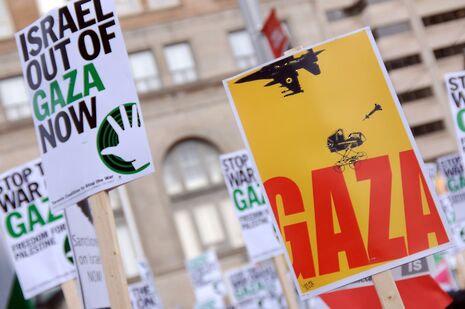The fetishisation of conflict: a liberal problem?
After last week’s Cambridge Palestinian Forum protest was cancelled, Gideon Levitt looks at how society glamorizes conflict

Amidst fresh fighting in the region, the dust has begun to settle over Gaza, and indeed the discourse which surrounds it. This gives us time to reflect, and take stock of the way we have approached the conflict. For most armchair liberals, the suffering of the Palestinian and Israeli people is incomprehensible. But the conflict does not stand in a public or political vacuum: the way in which we have privileged discussions on the conflict says a lot about the collective psyche of liberal activism. While we lament the loss on both sides, we must also be self-critical about how we do so. Has coverage of their plight been disproportionate?
Many argue that the intense passion the conflict inspires is entirely justified. One justification states that through illegal West Bank settlement and fatalities caused by the Israeli Defence Forces, Israel continually subverts its self-proclaimed title as the only genuine democracy amid the authoritarianism of the region. Another contends that the conflict forms the epicentre of a power struggle between the West and the Middle East, thus justifying its extensive focus.
Justifiably, many have stressed the nascent anti-Semitism that lurks below much of the supposedly-altruistic outrage in driving the intensity of the debate. This often takes the form of a conflation between Zionism and Judaism, illustrated by an abortive protest outside the Cambridge Synagogue by the local Palestinian Forum last week, where the Forum’s contempt for Israel’s actions mutated into a demonstration outside a place of worship for British Jews on the Sabbath. That the protest was intended to be silent and was ultimately cancelled is beside the point: the acceptability of the stance among some shows how passions around the conflict can spill into racial prejudice. Recent attacks on synagogues in Paris and the German city of Wuppertal demonstrate how such prejudices have become consciously imbued in Israel-Palestine discourse. Condemning aggression on both sides is a moral necessity, but so too is distinguishing between the actions of a specific state and a global religion.
But none of these arguments help explain the conflict’s centrality at the expense of other humanitarian disasters. Every civilian slain in this conflict is a tragedy – regardless of culpability – but this does not account for critics being lazily hypocritical in their approach to wider suffering. If one (rightfully) laments the Palestinian anguish on humanitarian grounds, they must surely project this outrage onto similar catastrophes in the region. Yet such equality of outrage is largely absent from current public and political agendas.
The Israel-Palestine struggle remains a ‘glamorous’ conflict – fetishised at the diplomatic and humanitarian expense of the less ‘attractive’ ones. One such crisis is that in Yemen, where the splitting of western Governates and Al Qaeda insurgency around the Arabian Peninsula resulted in 200 deaths and the displacement of 35,000 others last month alone. This made no impression on PMQs or, I suspect, on the zeitgeist barometer that is your Facebook newsfeed.
The disproportionate neglect of Middle Eastern suffering outside of Israel/Palestine has created a transcendent quality to the conflict. This preoccupation with the ‘occupation’ reflects a morbid apathy to Muslim deaths at the hands of coreligionists. Though Islamic State have wreaked humanitarian havoc across Syria and Northern Iraq for a number of months, it has taken the plight of Christians and Yazidis to galvanise a humanitarian response.
The complex political and sectarian nature of the violence across the Middle East undeniably contributes to this phenomenon. As a tangible, albeit crudely simplified, alternative, the international community often embraces the ever-accessible idea of ‘Jews vs. Muslims’. How sad an indictment upon modern humanitarianism it is that human loss can be prioritised so arbitrarily in this way.
It is important to stress that the fetishisation of conflict is not unique: arguing this would fetishise the fetish. The same can be seen in Iranian and North Korean nuclear developments, where the extensive attention is disproportionate to the relative threat. But as with the Israel-Palestine conflict, they fit conveniently into a self-perpetuating hero vs. villain narrative which appeals to the inconsistencies of public and political sentiment.
Blood spilled should correlate with ink spilled: the relative severity of a conflict should dictate the attention it receives. But the scale of public and political passion around the Israel-Palestine conflict has cemented it as the cause célèbre of liberal activism. Though this focus is crucial to alleviating suffering in Gaza, it fails to explain the relative neglect of other conflicts in the fiercely unstable region.
The doctrine of humanitarianism is supposed to be universal. It is a disturbing paradox, then, that our ‘liberal’ society is happy to embrace some, but not others, into its outstretched arms.
 News / Night Climbers call for Cambridge to cut ties with Israel in new stunt15 April 2024
News / Night Climbers call for Cambridge to cut ties with Israel in new stunt15 April 2024 News / Police to stop searching for stolen Fitzwilliam jade17 April 2024
News / Police to stop searching for stolen Fitzwilliam jade17 April 2024 News / Cambridge University cancer hospital opposed by environmental agency12 April 2024
News / Cambridge University cancer hospital opposed by environmental agency12 April 2024 Interviews / In conversation with Dorothy Byrne1 March 2024
Interviews / In conversation with Dorothy Byrne1 March 2024 Interviews / ‘It fills you with a sense of awe’: the year abroad experience17 April 2024
Interviews / ‘It fills you with a sense of awe’: the year abroad experience17 April 2024


